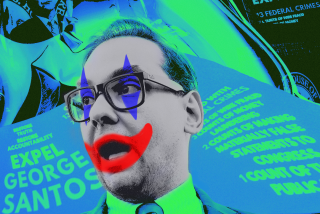Brazil’s Author-Politician Pens Odd Sequel to Storied Career
BRASILIA, Brazil — Of the dozens of characters Jose Sarney has invented as a novelist, perhaps none has so colorful a past, or so interesting a present, as the person he is now busily reinventing: himself.
More than just an author of moderate renown, Sarney is a politician -- and a former president of Brazil at that. His was a tenure that started and ended inauspiciously, and although he succeeded in getting elected to the Senate after stepping down as president in 1990, many here in the capital expected him to fade into the sunset.
But at 74, the man once described as “out to pasture” is confounding his critics. Through slick maneuvers, Sarney has insinuated himself back into the center of power as president of the Senate, where some pundits say he wields more influence than he ever did as leader of the republic.
“He knows how to play the game,” said David Fleischer, a veteran political analyst in Brasilia. “He knows when to make the right moves.”
What vaulted Sarney back into the national spotlight was a shrewdly timed political makeover two years ago involving the decision to support a man he used to revile. As president of Brazil, Sarney once warned that the country was “marching toward totalitarianism” and a “socialist revolution” after leftist candidates, led by Luiz Inacio Lula da Silva’s Workers’ Party, made gains in the late ‘80s.
Now, it is Lula who occupies the Planalto Palace, Brazil’s White House, after elections in 2002. This time, Sarney decided to back his erstwhile foe -- an astute about-face by a man who has been variously tagged by critics as an opportunist, a toady of former dictators, a carpetbagger and a mediocre writer.
For his change of heart, Sarney was rewarded with Lula’s support for the plum position he holds as head of the Senate and, by definition, leader of the National Congress.
In that capacity, Sarney has been instrumental in pushing through Lula’s legislative agenda. Last year, he worked diligently to help pass the president’s tax and pension reform plans, which many economists said were crucial for growth. This year, Sarney stifled a congressional inquiry into a corruption scandal that threatened to take down Lula’s closest advisor.
The current president is therefore deep in debt to the former one.
“Sarney is modest in describing his role, which he said is only to serve his country.
“It’s with that feeling that I supported Lula and am trying to help. I think he’s doing very well,” Sarney said in an interview in his wood-paneled Senate office, where he helps set the political agenda and doles out appointments with well-known savvy. “It’s with immense satisfaction that I see Lula being a success.”
That satisfaction may stem partly from the fact that his own fortunes are tied to Lula’s. Sarney’s term as Senate leader is due to expire early next year, and the constitution bars him from being reelected to the post. But if he has his way, which can only happen with Lula’s support, the National Congress will approve an amendment allowing him to keep his job.
The proposal has run into stiff opposition -- much of it from within Sarney’s Brazilian Democratic Movement Party, or PMDB. Publicly, Sarney professes indifference to staying on, calling it the wish of others and expressing a desire to return to writing. He is the author of more than 30 books of poetry and prose, some of them well received, few of them widely read.
His political role “constitutes a personal sacrifice for me at my age,” Sarney said. “I’m not saying I would rather leave the office, but I’m not seduced by it.”
This isn’t the first time the mustachioed politician with the Cheshire cat smile has sought to change the constitution to remain in power.
In 1987, as president, he lobbied the drafters of Brazil’s post-dictatorship constitution to refrain from restricting his term to four years from the mandated six, even though he had offered to serve just four years when he took office. He had reluctantly assumed the presidency following the unexpected death of President-elect Tancredo Neves. As Neves’ running mate, Sarney was elevated to the top job.
“Here I stand, with the weight of a moment that I did not request and did not desire,” he told the nation shortly after taking the oath of office in April 1985.
At the time, annual inflation was approaching 500%. To tame it, Sarney launched a currency-stabilization plan in early 1986 that worked wonders for several months, sending his popularity soaring and convincing him that he should serve a full six years.
But by the time the new constitution was being considered, the economy had soured once again, sparking riots. Sarney was forced to accept the compromise of a five-year term.
Whether his agility and experience can help him hang on to his current leadership post is an open question. Lula’s support, some analysts say, has turned out to be less forceful than Sarney had hoped, causing him to rethink how hard to push for a second consecutive term as Senate president.
And he lacks a strong power base within his party. At a PMDB conference in March, some members booed him for his alliance with the Workers’ Party.
“This is not the first time he’s been dissed,” Fleischer said. Then, mindful of Sarney’s survival skills, he added: “And probably not the last.”
More to Read
Sign up for Essential California
The most important California stories and recommendations in your inbox every morning.
You may occasionally receive promotional content from the Los Angeles Times.











